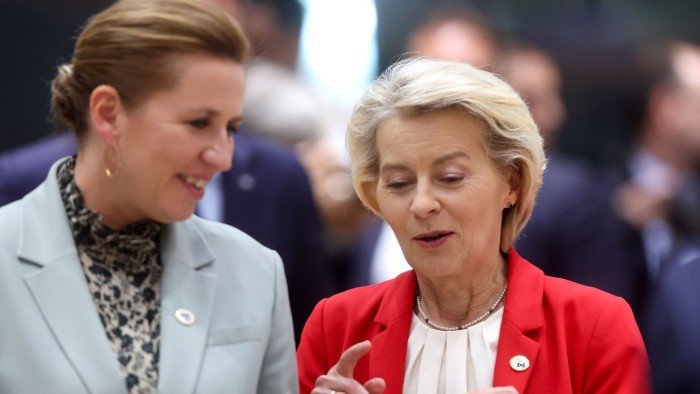This article is an on-site version of our Europe Express newsletter. Premium subscribers can sign up here to get the newsletter delivered every weekday and fortnightly on Saturday morning. Standard subscribers can upgrade to Premium here, or explore all FT newsletters
Good morning. Today, as the Danish EU presidency dawns, the country’s EU minister tells me why they’re focusing their six months on bombs and businesses. And our Balkans correspondent reports on increasingly violent protests in Serbia against the Vučić government.
Protect and prosper
Denmark takes on the mantle of steering the EU’s often unruly 27 member states today with a no-nonsense approach: let’s make the continent safer and richer, its Europe minister told the Financial Times.
Context: Every six months, the presidency of the council of the EU rotates among the bloc’s 27 members. Denmark’s stint until the end of the year gives it the power to run the meetings of national ministers and officials, set the agendas, and push national priorities.
“In the current security environment, it is crucial that Europe is able to defend itself, and it is urgent that EU delivers now in order for us to be able to defend ourself by 2030 at the latest,” said Marie Bjerre, Danish minister for European affairs.
Long considered the EU’s arch-pragmatist, Denmark is also seeking to leverage the current fears about the continent’s vulnerability — to both Russian tanks and competition from US and Chinese companies — to get serious about economic competitiveness.
“European companies are drowning in regulatory burdens. And it is undermining both our competitiveness and productivity,” Bjerre said. “Therefore a central priority for the Danish EU presidency will be to push simplification proposals from the commission as far as possible to create better framework conditions for Danish and European businesses.”
Marrying bombs and business into one pitch has become simpler since Russia’s full-scale invasion of Ukraine sparked a major rearmament push in Europe. In addition, former Italian premier Mario Draghi’s report on the EU’s woeful economic competitiveness outlined the defence industry as a sector ripe for overhaul, and a blueprint for others.
Bjerre said that Copenhagen would “finalise negotiations on a range of proposals, including the European Defence Industry Programme (EDIP), which aims to promote joint procurement and production of defence equipment.”
EDIP, which would pour more EU money into weapons production, has been stuck for more than 18 months due to capitals arguing over whether weapons that contain parts made outside the EU should be eligible.
Copenhagen would also work to “ensure stable supply chains, as well as integrate the Ukrainian defence industry into the European defence industrial base,” Bjerre added.
Chart du jour: Front line

Is Europe prepared for war? With US support faltering, Nato nations are fortifying Europe’s eastern frontier to defend against future Russian aggression. Delve into our interactive investigation.
Mounting pressure
Nerves are fraying in Serbia after eight months of protests against President Aleksandar Vučić’s government, writes Marton Dunai.
Context: Protests erupted eight months ago as first university students, then a steadily growing cross-section of society, rose up against the perceived corruption and cronyism of Vučić’s regime, blaming it for the collapse of a train station roof that killed 16 on November 1.
Mostly peaceful until now, the demonstrations are becoming more tense as protesters are trying to force early elections, and clashes broke out over the weekend.
Police arrested dozens in Belgrade on Saturday, after which people erected barricades in protest against the arrests. Yesterday, police forcibly took down the barricades and made more arrests.
Vučić, whose term expires in 2027 — the same year parliament elections are due — has rejected the demand for an early vote and said Serbia would stay the course in the face of what he called “terrorism”.
“The state has enough strength and the state will ensure law and order,” Vučić told journalists yesterday, speaking at a funding conference in Spain.
Russia, Serbia’s old Slavic ally, joined in the growing cacophony. Kremlin spokesman Dmitry Peskov said: “We cannot rule out that well-known methods are being used there to provoke colour revolutions”, referring to the movements that rose up against Moscow-friendly regimes in Ukraine and Belarus.
Saturday’s demonstration likely drew more than 100,000 participants, showing that the popular uprising against Vučić is far from losing steam.
The European Commission is “closely monitoring” the situation and “condemns” any act of hatred and violence, a spokesperson said. “The right of peaceful demonstration is to be upheld in Serbia.”
What to watch today
-
European Commission president Ursula von der Leyen participates in a strategic dialogue with the World Economic Forum
-
Nato secretary-general Mark Rutte speaks at the Airbus Top Executive Forum in Toulouse, France.
Now read these
Recommended newsletters for you
Free Lunch — Your guide to the global economic policy debate. Sign up here
The State of Britain — Peter Foster’s guide to the UK’s economy, trade and investment in a changing world. Sign up here
Are you enjoying Europe Express? Sign up here to have it delivered straight to your inbox every workday at 7am CET and on Saturdays at noon CET. Do tell us what you think, we love to hear from you: europe.express@ft.com. Keep up with the latest European stories @FT Europe
